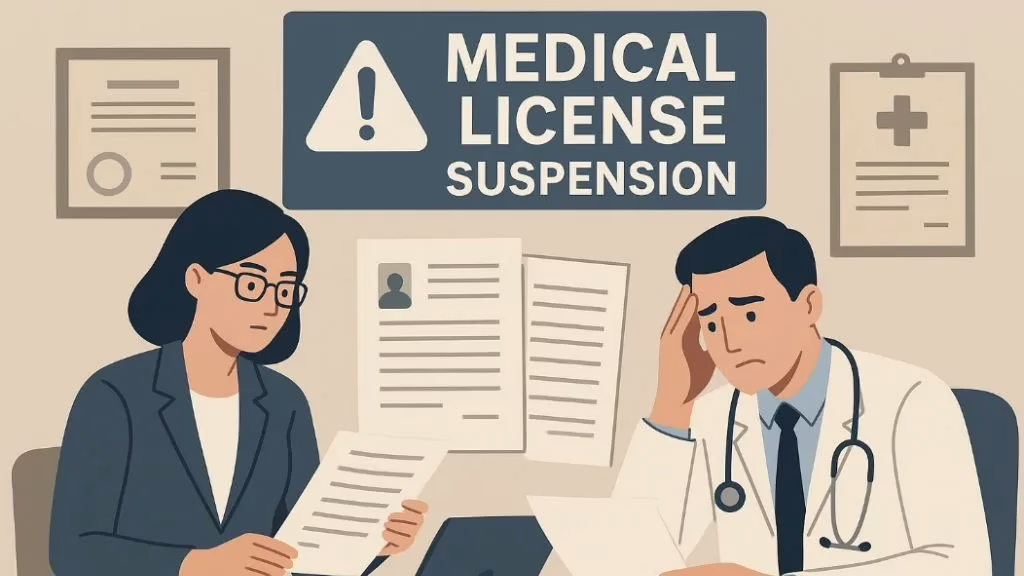Medical license suspension impacts careers, and patients affect healthcare access. Understanding the reasons behind such moves is crucial. Knowing how to respond could make the difference between temporary setbacks and everlasting damage.
What is a medical license suspension?
Medical license suspension is the temporary elimination of a physician’s authority to practice. This movement can be enforced through a state medical board because of expert, legal, or moral worries. During suspension, no medical pastime is legally approved.
Legal and Ethical Foundations
Medical boards uphold strict requirements. Physicians need to observe nearby and federal laws, scientific ethics, and board rules. Failure in any region may additionally bring about license suspension or revocation.
Common legal triggers include:
- Criminal costs
- Substance abuse violations
- Medicare or coverage fraud
- Repeated malpractice judgments
- Ethical breaches may additionally involve:
- Patient neglect
- Misrepresentation of credentials
- Unprofessional conduct
- Boundary violations
Each infraction requires a distinctive overview by regulatory bodies.
Incomplete Hospital Credentialing
Hospital credentialing errors can also cause suspension. Inaccurate or outdated documentation might also violate institutional guidelines. Hospital credentialing through the state varies. Different regions follow wonderful policies and timelines.
Boards frequently collaborate with hospitals. Any problem raised at any point in the credentialing process may be forwarded for investigation. Suspension can arise in the course of audits or reappointments if discrepancies surface.

Failure to Maintain Continuing Education
Most states require physicians to complete Continuing Medical Education (CME) hours. These hours show ongoing clinical know-how. Failing to meet CME obligations may additionally bring about disciplinary measures, consisting of suspension.
Board audits randomly pick licensees to verify CME compliance. Non-compliance regularly results in temporary suspension until documentation is complete.
Substance Abuse and Impairment
Substance abuse remains a principal purpose for clinical license suspension. Impaired judgment or performance places the affected person’s protection at risk. medical boards may act on:
- DUI or drug possession prices
- Complaints from colleagues or staff
- Failed drug screenings
Rehabilitation applications may be required before reinstatement. Boards might also mandate monitoring or continued treatment for situations of license restoration.
Malpractice and negligence
Repeated malpractice claims frequently trigger board critiques. An unmarried judgment won’t result in instantaneous action. However, patterns of negligence entice more profound scrutiny.
Red flags include:
- Multiple settlements within a short duration
- High affected person grievance volume
- Peer reports of risky practices
Boards compare clinical conduct, effects, and documentation. License suspension follows if risks to public protection are confirmed.
Inaccurate Documentation or Fraud
Inconsistent medical records or billing fraud regularly result in research. Falsified credentials or altered medical statistics can cause serious disciplinary effects. Accurate documentation is vital in each private and medical institution setting.
Fraudulent billing to Medicare or personal insurers invites both board and federal consequences. Physicians must comply with national and local laws related to the patient’s facts, identity verification, and knowledgeable consent.
Failure to Report Required Information
Physicians are regularly required to self-record adjustments, together with:
- Criminal charges
- Medical malpractice settlements
- Loss of health center privileges
- Address or name changes
Failure to report can result in instantaneous license suspension. Medical forums track those factors to ensure transparency and public trust.
License Renewal Lapses
Missing a license renewal deadline can also bring about an automated suspension. Some states allow grace intervals, even as others impose consequences straight away. Reinstatement might also require:
- Additional costs
- Updated credentials
- Re-review by using the board
Physician licensing offerings help avoid this outcome via well-timed submission and report monitoring.
Medical Board Investigations
A pending board investigation can also bring about a brief license suspension. Boards use interim suspensions to prevent potential harm to patients at some point in ongoing evaluations. Such action is precautionary, not a final judgment.
Investigations can also arise from:
- Anonymous criminal cases
- Peer-evaluated reviews
- The public or the affected individuals are concerned.
- Transparency and cooperation are vital during the process.
How Boards Notify of Suspension
Boards send official notices by mail or e-mail. Notices outline:
- Suspension length
- Reason for movement
- Steps for reinstatement
- Appeal manner
Public statistics usually mirror suspension information. Hospitals and insurance vendors also receive respectable updates.
Consequences of Medical License Suspension
Suspension influences all elements of professional lifestyles. Consequences include:
- Hospital privilege loss
- Termination of insurance contracts
- Loss of DEA registration
- Reputation damage
Hospital credentialing by state is frequently linked to licensure at once. A suspended license affects hospital appointments and insurance eligibility.
Addressing a Medical License Suspension
Steps to address suspension encompass:
- Understand the Notice: Read and verify board findings.
- Legal Representation: Retain a healthcare lawyer.
- Gather Evidence: Collect files, records, and communication logs.
- Respond Promptly: Meet deadlines and required documents.
- Participate in Hearings: Attend all overview or appeal conferences.
- Rehabilitation or CME: Complete any remedial packages.
- Stay Updated: Maintain regular communication with the board.
Compliance suggests a willingness to make accurate mistakes—boards often supply reinstatement after corrective motion.
Role of Physician Licensing Services
Physician licensing offerings provide help at some point in the reinstatement procedure. Services consist of:
- Application reprocessing
- Credential updates
- Reference series
- Compliance monitoring
- Appeal form submissions
These offerings help ensure proper documentation and reduce delays.
Preventive Best Practices
Avoiding license suspension requires proactive steps:
- Complete the CME necessities.
- Maintain accurate and timely documentation
- Avoid billing inconsistencies
- Stay up-to-date on national guidelines
- Report the required updates right away.
- Use physician licensing offerings for administrative help
- Prevention reduces pressure, economic loss, and reputational harm.
Hospital Credentialing and Suspension Links
Hospital credentialing by the state immediately influences license standing. Credentialing groups verify:
- Background history
- Education credentials
- Disciplinary records
- Malpractice claims
- Peer reviews
Discrepancies at some stage in credentialing can also alert boards. Clean information and correct information lessen risk.
Credentialing timelines vary by country. Delays in one region can affect the overall board status. Working with trusted credentialing and licensing partners streamlines compliance.
Reinstatement After Suspension
License reinstatement relies upon the nature of the violation. Common board requirements include:
- Written apology or explanation
- Completion of corrective training
- Evaluation of intellectual or bodily health
- Reapplication rate charge
- Proof of changed conduct
Some reinstatements include probation or ongoing oversight. Monitoring may additionally last months or years.
Long-Term Reputation Management
- Restoring expert recognition is vital. Actions include:
- Transparent conversation with employers
- Participation in accredited rehab or training
- Legal clearance of pending charges
- Engagement in voluntary CME
- Use of third-party compliance services
Hospitals and insurers decide upon complete disclosure. Reputation recovery takes time, but clean corrective steps build confidence.
Conclusion
Medical license suspension has excessive consequences. Errors, ethical violations, or omissions cause massive setbacks. Most suspensions are preventable through vigilance and compliance.
Credential accuracy, right reporting, and state-by-country medical institution credentialing adherence are vital. Physician licensing services assist those efforts, reducing risks and improving approval timelines.
A proactive method ensures uninterrupted clinical exercise and strengthens patient acceptance as true.






